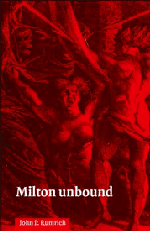5 - The art of generation
Published online by Cambridge University Press: 30 September 2009
Summary
Like to a chaos, or unlick'd bear whelp
That carries no impression like the dam
Richard IIIComus, I have argued, reflects young Milton's wish to renounce a compromising involvement with identity-threatening maternal figures, whether in the guise of a fatally prolific nature or a Circe-like church. The Lady resists acquiescence in a natural world that would efface her spiritual singularity and seeks instead the lofty autonomy described in the Attendant Spirit's epilogue. The rejection of Comus's debauchery may seem to us – as it surely would have to an audience of her contemporaries – proper and justly contemptuous. The extreme terms of the rejection, however, imply an unrealistic dread of entanglement and aspiration for self-sufficient exaltation – the cleaving emotional aftermath of a lost paradise that never was. The grandiose material transcendence enabled by “the sage / And serious doctrine of Virginity” is nostalgia for an illusion (lines 786–87). Hearkening back to the hallucinatory totality of infancy, it recalls not a state of transcendence but one of complete dependence on the mother.
Paradise Lost also reflects a desire for self-sufficient totality, primarily sexual totality, though in a genre less given to fantasy than the masque. If Milton's narcissistic yearning for a sense of completeness was subject to continual renegotiation, it nevertheless continued to influence his poetry, not least the great works of his maturity. The poetic benefit of being sexually complete, female as well as male – like Tiresias – was a share in or at least consciousness of total creative power, such as that experienced by Adam in the creation of Eve.
- Type
- Chapter
- Information
- Milton UnboundControversy and Reinterpretation, pp. 94 - 117Publisher: Cambridge University PressPrint publication year: 1996

